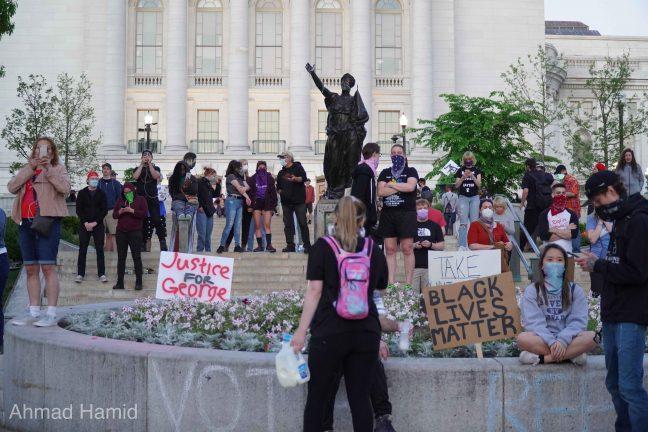Republican lawmakers proposed amendments to Bill 296 that would make it a felony to attend a protest that turns violent.
The bill defines a riot as “a public disturbance that involves an unlawful assembly” and an act or threat of violence or destruction of property.
Bill would allow use of Open Enrollment, School Choice programs to avoid school COVID-19 mandates
The bill outlines the specific penalties for committing these acts. According to the penalty provisions at the end of the bill, a person who knowingly participates in a riot that results in “substantial damage to the property of another person or bodily injury to another person” is guilty of a Class I felony.
The felony would carry a minimum penalty of 45 days in jail and a maximum penalty of a $10,000 fine and up to three and a half years in prison. Inciting or attending a riot and blocking a roadway would constitute a misdemeanor crime under the bill, carrying a minimum penalty of at least 30 days in jail and a maximum penalty of up to a $10,000 fine and 9 months in jail.
Sponsors have said the bill hopes to curb incidents similar to the violence last summer that erupted in Kenosha following the police shooting of Jacob Blake.
Kathleen Culver, a University of Wisconsin First Amendment and free expression expert, said there is a small number of narrow classes of speech that are not protected by the First Amendment. One of those classes is true threats, which under statute encompasses threats against an individual that are intended to make that individual fear for their safety, health or life.
“What’s interesting here is that the portion that talks about a threat and a clear and present danger refers to threats against both personal injury and damage to property,” Culver said. “True threats are deemed outside the bounds of the First Amendment’s protection. … So expanding that to property damage could put this law at risk of running afoul of the First Amendment.”
Wisconsin GOP fights back against new state COVID testing requirements
Culver explained that the bill is running up against a constitutionally protected right to assemble and seek redress of grievances because the law could punish people for what has been protected speech under legal precedent.
Such a bill could cause a chilling effect, Culver said. The term refers to people’s natural tendency to self-censor when they fear legal implications may occur, even if the speech is actually protected.
“When you’re talking about violence that would damage property and also injure people, generally you’re talking about incitements to violence,” Culver said. “So the extension from just personal injury to damage to property could be problematic for them constitutionally.”
State Sen. Kelda Roys, D-Madison, said the bill would negatively affect free speech and the right to protest. Roys voiced concerns over how the bill could open the door to government or police action against groups they disagree with.
She said the bill’s penalties would exacerbate the problem of civil rights protestors being treated unfairly by law enforcement. Roys drew a comparison between police prejudice when it comes to certain protesters, pointing to the harsher response to Black Lives Matter protesters as opposed to the law enforcement response on Jan. 6 siege of the Capitol.
Roys said she is also frustrated with the bill’s definition of a riot.
“Basically, it’s three or more people gathered in a certain area with violence or threat of violence or destruction of property or threat of destruction of property,” Roys said.
She said this description could implicate people who are not involved in the riot, like bystanders, reporters or peaceful protesters.
Roys said she is concerned that this bill will give the government power to declare someone guilty for the acts of someone else.
“We really need to be careful about criminalizing people who stand in the wrong place,” Roys said.
During a public hearing in September, Sen. Van Wanggaard, R-Racine, said the proposal “addresses the growing popularity of riots,” according to WPR.
Wanggard, who is a sponsor of the bill and a former police officer, has penned similar legislation in the past and argued it is a necessary step in light of destruction from protests last summer.
“In the wake of recent disruptions both in our state and across the nation, it is important to focus on keeping the public safe and holding those responsible accountable,” Wanggaard said at the hearing.
Several other supporters of the bill include the Badger State Sheriffs’ Association, the Wisconsin Professional Police Association and the Wisconsin Sheriffs and Sheriffs Deputy Association.
Roys said there are bipartisan concerns about the bill, with conservative groups like Americans for Prosperity registering in opposition to the bill as it “could be inappropriately applied by government officials in a partisan or otherwise biased manner.”
UW professors discuss the role of critical race theory in classes, the political arena
Lawmakers who proposed the bill are specifically targeting certain groups of people, Roys said. Her stance is that there’s no need for the bill on a practical level because the aggressive behaviors outlined in the bill are already illegal.
Roys does not think the bill will actually be passed. But Roys thinks it’s possible that it would be voted on by the legislature but does not believe Gov. Tony Evers would allow it to pass.














